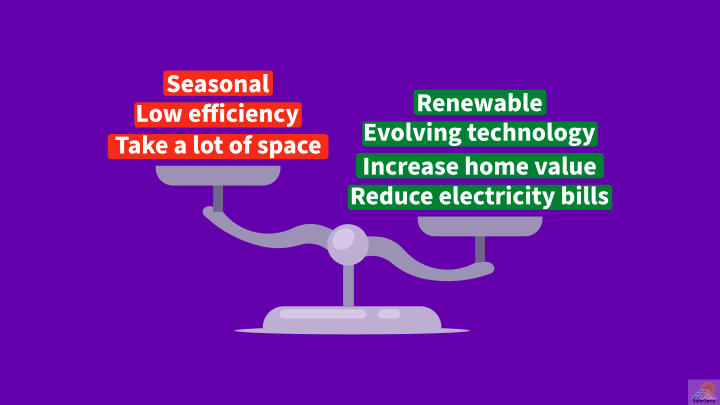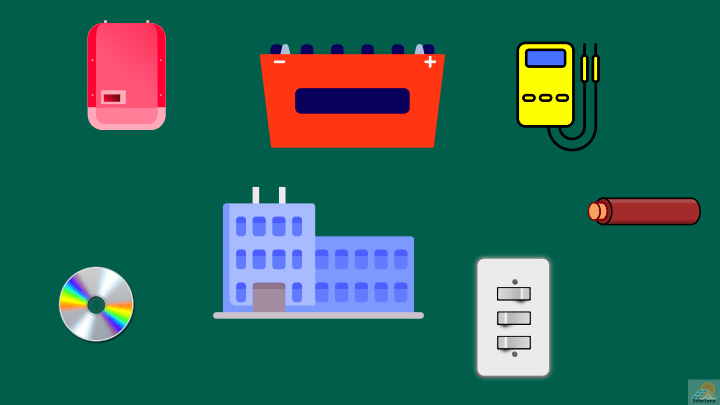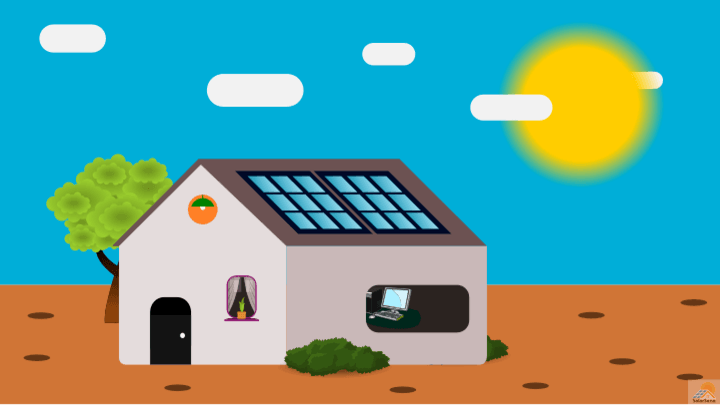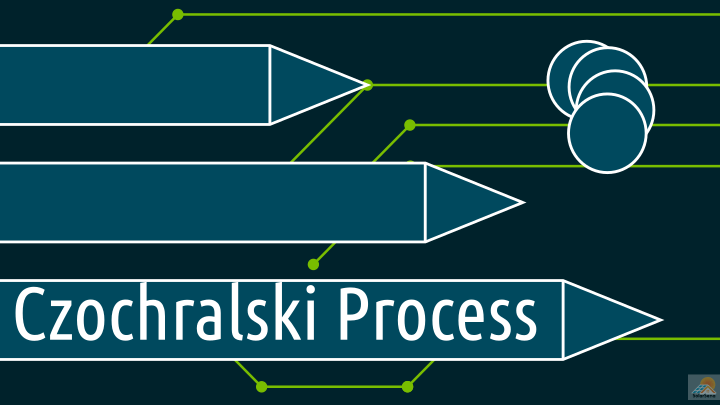Today, solar panels are becoming synonymous with renewable energy. They are the best way to harness solar energy. These simple, durable electrical devices have become a promising hope of people and may overtake nonrenewables in the distant future. A common question among people and homeowners who are planning for solar panel installation is “what are the advantages and disadvantages of solar panels.”
Advantages and disadvantages of solar panels
The table below gives a quick overview of all the advantages and disadvantages that we will be discussing.
| Advantages | Disadvantages |
|---|---|
| More renewable and save the environment | Some Pollution concerns |
| Save you from increasing electric bills | Expensive and not affordable by all |
| Low maintenance | High front-end cost |
| Increase your home value | Take a lot of space and are not mobile |
| One-time investment | Seasonal and Sun dependence |
| Long-term returns | Uneven across the global |
| Reduce your carbon footprint | Cost of energy storage |
| Solar panels are evolving technology | They suffer from low efficiency |
| Diverse applications | Uncertain for some purposes |
Advantages of solar panels
The reason why solar panels have gained so much attention is because of the advantages they offer. Further, sharp declines in prices in recent years have made them a more appealing option. Let’s look at what are the benefits of solar panels and how they are superior to others.
Renewable
Solar panels convert falling sunlight to electricity. We know solar energy is renewable and ever-lasting. Unlike fossil fuels, the sun is not going to leave us for the next 5 billion years. Seeing that, we can be pretty confident solar energy will be the primary energy for future human civilization.
Environment-friendly
Toxic gases coming out from the burning of fossil fuels are not good for you as well as the environment. Excessive exploitation of fossil fuels has caused the air in cities to be deadly. Nowadays, it is hard to see starry skies. Climate change is existential dread. Solar panels can help to alleviate such problems. For example, a solar powered air compressor does not emit any carbons unlike its standard counterparts.

As more people go for solar, less fuel and coal will be burned to generate electricity. Further, solar panels do not emit any greenhouse gases, so they are far more environment-friendly than traditional energy sources.
Reduce your electricity bills
As more people go for solar, less fuel and coal will be burned to generate electricity. Further, solar panels do not emit any greenhouse gases, so they are far more environmentally-friendly than traditional energy sources.

Many people have already realized there is an urgent need for change and switched to solar power. In lots of cases, buyers have completely achieved independence from utility power.
Low maintenance
Low maintenance is a major advantage of photovoltaic systems. Once you install solar panels, you do not have to worry about them for at least a decade or two. You may have to occasionally clean them. A sweeping wet cloth over them is sufficient to remove dirt or any particle deposits. If any doubts, professional cleaning services are also available.
There is no wear and tear since solar panels have no moving parts, like in wind turbines.
Moreover, modern solar panels are also immune to seasonal changes. So, they remain protected from rain, hail, and snow.
Increase your home value
Solar-powered homes are more attractive to buyers and more eco-friendly. They definitely increase the value of your property. A home that lowers electricity bills is no doubt more appealing to buyers than regular ones.

Buyers consider solar-powered properties as a premium asset and are ready to pay a premium value. Just like modernizing your furniture or renovating your kitchen, it improves your home selling price.
One-time investment
The photovoltaic system is a one-time investment. You pay once and then enjoy savings for the next 25 years. Since solar panels are most maintenance-free, they do not incur any recurring costs.
Long-term returns
As discussed earlier, solar panels go on over 25 years. It is one of the strongest benefits of photovoltaic technology. Solar panels are persistent. Even after years, there is a marginal drop in power output.
Reduce your carbon footprint
Your carbon footprint is a measure of carbon dioxide released into the atmosphere through your activities. Many people in the world are very conscious of their carbon footprint. Some are even ready to spend more money to save the environment.
By switching to substantial and clean technology, you can reduce your negative impact and help the world to fight against climate change.
Solar technology is evolving
Solar technology is evolving and growing. Scientists around the world are developing newer materials that are more efficient. Every year the efficiency of solar cells is pushed to new heights.
Businesses are investing more time and money in research and development. Most people might be familiar with only traditional silicon solar cells. But there are more than a dozen varieties of solar cells, such as organic solar cells, perovskite solar cells, dye-sensitized solar cells.
There is no doubt photovoltaic technology will dominantly contribute to future energy needs.
Diverse applications
Besides residential and commercial installations, solar panels have found applications in many areas. They are used to produce power in remote areas, where conventional power grids can’t be reached. In underdeveloped parts of Africa, solar panels help in water purification.
Another common application is solar-powered pumps. They run on clean energy and help you to lighten your energy burden.
In the last couple of years, numerous utility companies have invested in photovoltaic power stations. It facilitates the adoption of clean electricity right at the central source.
Have you ever wondered how astronauts working in the International Space Station (ISS) get electricity? Yes, the answer is solar panels. Engineers have designed high-efficiency solar arrays that suit for space applications and produce power from sunlight. Photovoltaic technology has seen a huge application in the space industry, and perhaps it’s the only way to get electricity.

Disadvantages of solar panels
Although people frequently stretch the advantages of solar panels, we should not overlook their disadvantages. Solar panels have some serious limitations that are enough to make their future impotent. We are still learning to tackle these challenges. Each of them is discussed below.
Pollution
It may be unexpected to many readers that solar panels are, to some extent, responsible for pollution. Most solar panels in the world use high-grade silicon as a photovoltaic material. We extract silicon from mines and purify it by various chemical processes. Purified silicon is further processed to form crystalline silicon wafers, which are cut to give solar cells.
In all these steps, pollutants and greenhouses are released into the environment. Sulfur and carbon oxides are common among them.
Some panel manufacturers use toxic elements, like cadmium, which are harmful to our health on exposure. Although the leakage of toxic elements from panels is rare, there are some speculative concerns with it.
Nevertheless, pollution caused by solar panels is nothing in comparison with nonrenewables.
Wastage
Typical solar panels come with a warranty of 25 years. They last for a pretty good number of years. After the lifespan, degraded solar panels become piles of solar waste. According to the International Renewable Energy Agency (IRENA), by the end of 2016, the world has generated around 25,000 metric tons of solar panel waste. The number is projected to reach 78 million metric tonnes by 2050.
The good news is that we can recycle worn-out panels. But few efforts are seen in recycling solar waste.
Expensive
Installing a photovoltaic system is not always budget-friendly for everyone. Although the price varies from region-to-region, a typical 5 kW of a solar system, as of 2020, can cost $14k to $17k in California. These figures are not permanent; they are certain to decrease in the coming years.
High front-end cost
The high cost of solar panels is bad, but paying the high cost, in the beginning, is worse. You can avail yourself of solar loans or other financing options to avoid the high front-end cost. In the United States, many local solar contractors have already partnered with financing companies to easy the process for buyers.
Take a lot of space
Solar panels are not space-friendly. They take a lot of space, which could be used for other purposes. For example, if you have panels installed in your backyard, they will block a meaningful amount of open space. They may make you feel less spacious and interfere with your other backyard activities.
Even if you plan for a roof-mounted system, you still need a significant amount of roof space. Otherwise, it will not produce effective power. It is a major drawback of solar panels. In order to produce sufficient power, solar panels need a large open space. There are also other problems, like shading from surrounding structures or trees, which you have to consider while defining open space.
In the future, when we have more efficient solar panels, the space required will decrease. But as of now, there is no solution to it.
Not so mobile
Installing solar panels on your home is a labor-intensive job and requires some electrical skills. Further, they are fixed and mounted on the roof or ground. Removing or adjusting them will require help from the expert. Moreover, solar panels take a few years to reach the break-even point. So, if you move a lot, possibly it’s not a good investment for you.
Seasonal and sun dependence
Despite the fact that the sun will last very long, it is not available to us all the time. Solar irradiance keeps changing with seasons and within a day.
In summer, the sky is clear, and the sun is bright, so solar panels produce the most power, while in winters or on rainy days when the sun is blocked by fog or clouds, you will have to depend more on traditional electricity.
Sun is also not available in the night, so panels remain powerless in the dark.

Uneven across the globe
Solar energy is not unequally distributed across the earth. Like seasonal dependence, it is not a fault of technology but a limitation that comes from nature. Solar irradiance varies along with the altitude of the earth.
Countries closer to the equator have maximum solar irradiance, whereas others that are closer to the poles get the least. As a result, the same photovoltaic system will deliver more power in the United States than in Finland.
Cost of energy storage
We have addressed the seasonality of solar energy in the previous sections. It can be mitigated if we know how to economically store harnessed energy. Unfortunately, we are still behind in storage technology. There are two obstructions we need to consider: the cost of batteries and the size of batteries.
Batteries account for a good portion of the overall cost of the photovoltaic system. If you are planning to store solar power, you will learn that they are not only expensive but also not space-friendly.
They suffer from low efficiency
Presently, the most efficient residential solar panels available in the market give around 22% efficiency. It is a big improvement in comparison to the past. But this number is not sufficient to subsist.

Around 80% of incident solar-energy is lost. Definitely, solar panels are not efficient. Low efficiency is also the root cause of many other problems.
Uncertain for some purposes
We cannot fit solar panels for all purposes. Their lacking efficiency and expensive batteries limit their applications. For example, solar cars and solar planes are impractical. Non-renewables are still the most economical source since they are compact and deliver high energy per unit volume.




